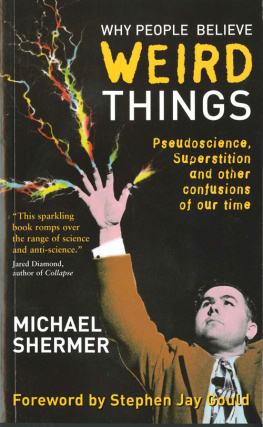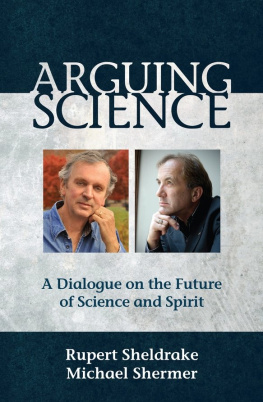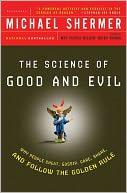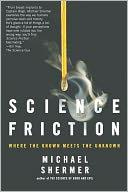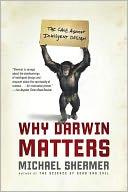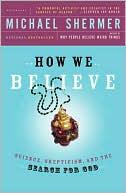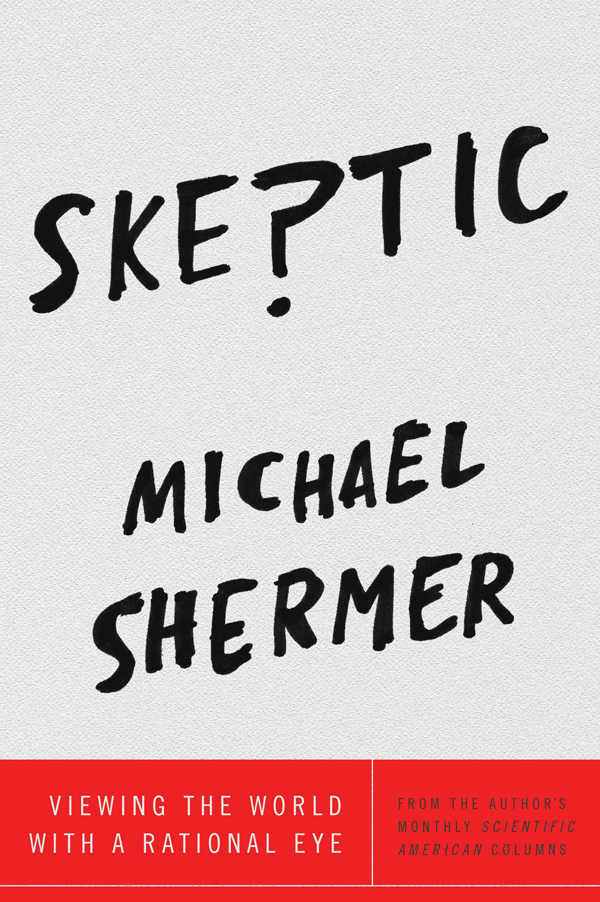Contents
Guide

The author and publisher have provided this e-book to you for your personal use only. You may not make this e-book publicly available in any way. Copyright infringement is against the law. If you believe the copy of this e-book you are reading infringes on the authors copyright, please notify the publisher at: us.macmillanusa.com/piracy.
To my sister Tina
Introduction
Viewing the World with a Rational Eye
Ever since the early 1980s, when I discovered the elegant and entertaining essays by the late Harvard evolutionary biologist and paleontologist Stephen Jay Gouldinitially through his early essay collections in books ( Ever Since Darwin and The Pandas Thumb ) and subsequently in monthly form as they rolled off the presses for Natural History magazineI have maintained a deep passion to write science for general audiences. Not popular science writing per se, but more along the lines of what Gould strove for in his essays: deeper truths within scientific discoveries. As he wrote in the preface to a later collection of essays, The Lying Stones of Marrakech : I have tried, as these essays developed over the years, to expand my humanistic take upon science from a simple practical device into a genuine emulsifier that might fuse the literary essay and the popular scientific article into something distinctive, something that might transcend our parochial disciplinary divisions for the benefit of both domains (science, because honorable personal expression by competent writers cant ever hurt; and composition, because the thrill of natures factuality should not be excluded from the realm of our literary efforts). Transdisciplinary doesnt begin to describe the breadth and depth of Goulds oeuvre, and it has been a mark at which I have aimed in my own writing.
In a 2002 paper published in the journal Social Studies of Science I presented the results of a content analysis I conducted of all three hundred essays Gould penned in his twenty-five-year monthly streak, revealing five deeper themes that appeared in them: Data-Theory, Times Arrow-Times Cycle, Adaptationism-Nonadaptationism, Punctuationism-Gradualism, and Contingency-Necessity. The first theme, on how data and theory interact, interested me the most, inspired as I was by a quote Gould occasionally employed from his hero Charles Darwin: How odd it is that anyone should not see that all observation must be for or against some view if it is to be of any service! The context for that quote, as I explicate in the first essay in this volume (in what I call Darwins Dictum), was that Darwin was challenged by his critics to just put his data forward and not to bother theorizing too much. But as the founder of evolutionary theory knew, the facts never just speak for themselves; they are always viewed through the lenses of theory. The twoobservations and views, data and theoryare the conjoined twins of science.
That themethe interplay of data and theoryis the central and unifying schema in all the essays in this volume. Gould completed his streak of three hundred consecutive monthly essays in January 2001. My first essay in Scientific American was in April of that year, but with a three-month publication lead time I actually penned the first one that January, close enough for an intellectual transition (if only in my mind). The seventy-five essays in this volume are from the first six and a quarter years of my own streak thatgood health and fortune willingwill reach three hundred in April 2026, with several more essay volumes to come. I have grouped them into ten sections by topic within the larger data-theory schema.
I. Science. In this section I set the tone of the entire series with Darwins Dictum in the first essay, giving examples of why data and theory are necessarily bound together, then move through essays whose themes related to general scientific principles and debates, such as what scientists should say when theyre wrong (I was wrong is a good start) and what it means to be wronger than wrong, scientism and why people look up to scientific superstars like Stephen Hawking, how to tell the difference between the ideas of a cutting-edge scientist versus a cutting-edge amateur, how to communicate science in both words and pictures, and the nature of scientific replication.
II. Skepticism. These essays range from classic skeptical debunkings (from the faked moon landing to 9/11 conspiracy theories) to the delicate balance between orthodoxy and heresy in science and when we should be skeptical of a heretical idea, and the fine art of baloney detection.
III. Pseudoscience and Quackery. There is also a difference between heresy and crazy, and the essays in this section explore why smart people fall for the latter, why being too open-minded is not always a good idea, why scams and cons work, and why bad ideas are dangerous to the point where they can kill.
IV. The Paranormal and the Supernatural. The essays in this section are about nothing. That is to say, there is no such thing as the paranormal and the supernatural; there is just the normal, the natural, and mysteries we have yet to explain. Talking to the dead, ESP and PSI, Bible codes, random electronic signals that sound like voices, illusory patterns in Beatles albums, and what happens when a skeptic goes to the New Age capital of the world.
V. Aliens and UFOs. This is one of my favorite of all subjects in the skeptical pantheon of things to investigate, because there are really two different questions: Are aliens out there? and Have aliens come here? The answers to these two questions are probably and probably not. These essays consider what it means to search for extraterrestrial intelligence, and how we would know when we made contact, a good reason why we have not yet heard from ET, what time travel means for the search, and what it feels like to be abducted by aliens.
VI. Borderlands Science and Alternative Medicine. For my money the most interesting ideas are not those that are obviously right or wrong, but those that, if they are true, would be revolutionary. Nanotechnology and what it means for immortality, cryonics, cloning, and cures for the common cold, and other remedies that promise us the world but rarely deliver.
VII. Psychology and the Brain. I am by training a psychologist, so I am always interested in how our brains work, especially how we can so easily be fooled and mistaken in believing things that are not true. The essays in this section explore the many facets of human psychology as they relate to our beliefs about the world, especially how and when our intuitions serve us well or lead us astray.
VIII. Human Nature. Fundamental to who we are and why we think and act as we do is our evolved biological nature, and the essays here consider a number of highly controversial scientific theories in this regard. For example, are we noble or ignoble savages? Are we biologically predisposed toward making love and war? Can we unweave the heart to understand love and attachment? And what is happiness, anyway, and can science measure it?
IX. Evolution and Creationism. Ever since I was in college this topic has periodically erupted on the political and cultural landscape as scientists hope creationism goes away while creationists continue to evolve new strategies to wedge their ideas into the minds of the public, including and especially students. These essays dip into that controversy from a number of different points, ranging from science to politics.



